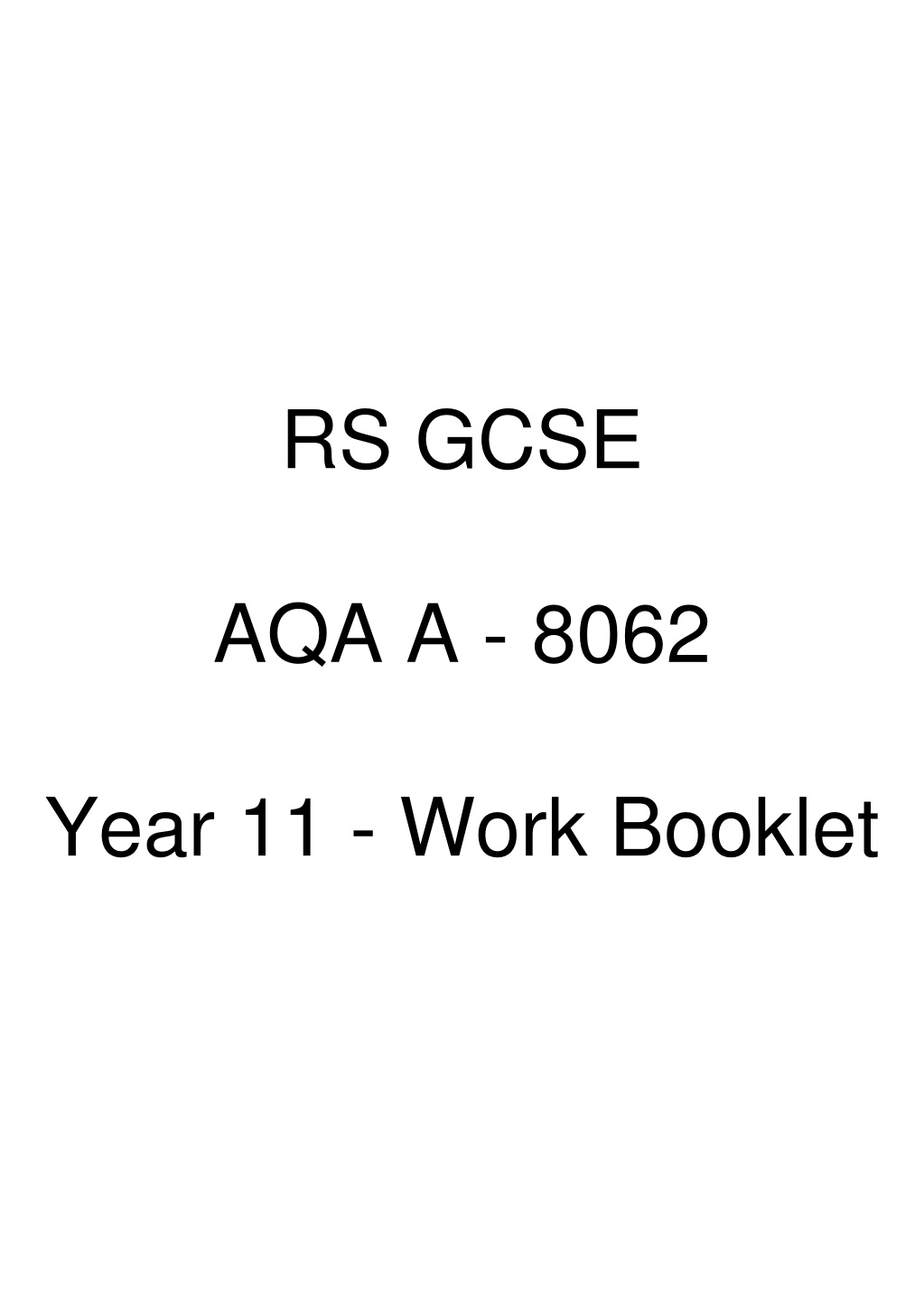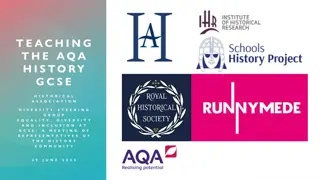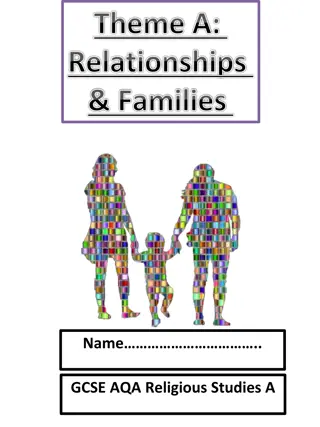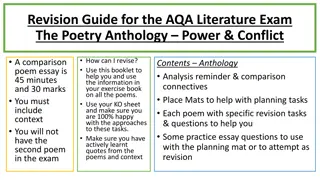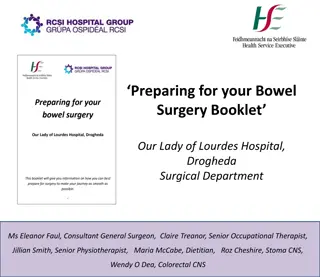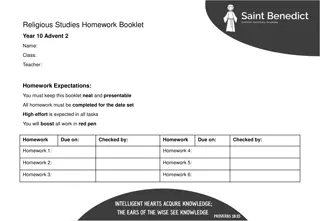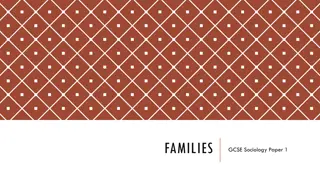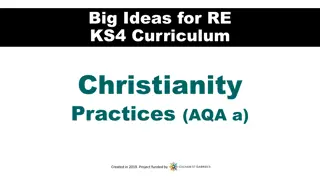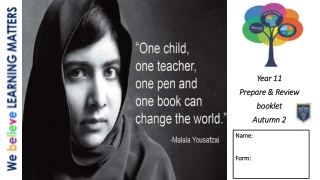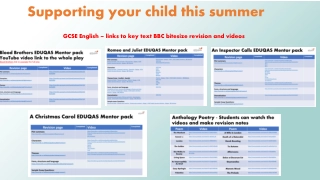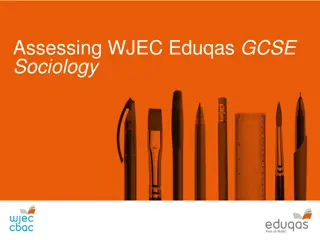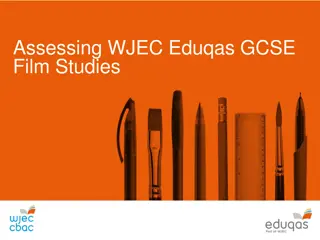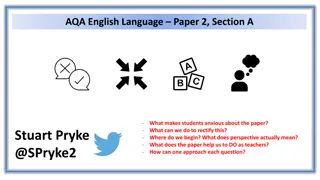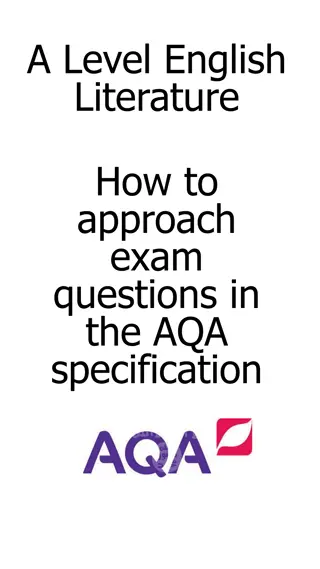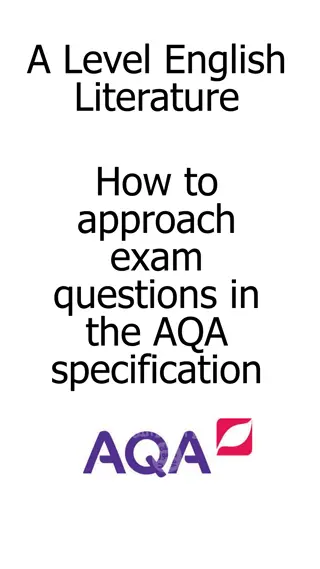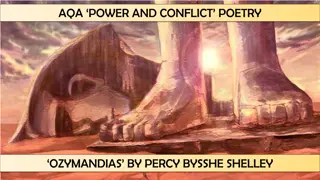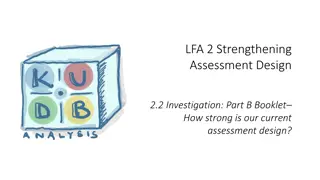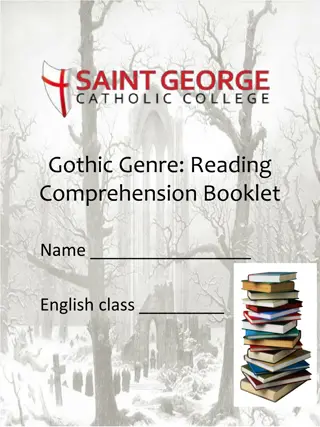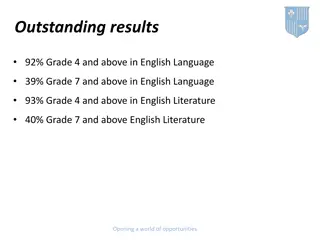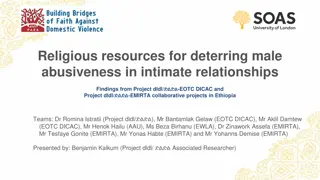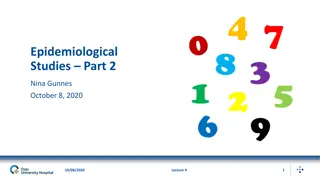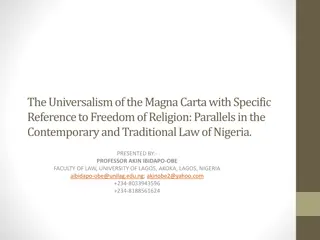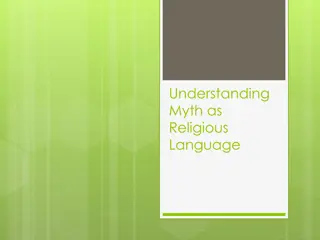RS GCSE AQA A - 8062 Year 11 Study Booklet for Religious Studies
This Year 11 RS GCSE AQA A work booklet covers important topics such as exam information, question structures, mark schemes, personalised learning checklists, and the study of religions with a focus on Christianity beliefs and teachings. It provides students with valuable resources to enhance their understanding and preparation for the exam.
Download Presentation

Please find below an Image/Link to download the presentation.
The content on the website is provided AS IS for your information and personal use only. It may not be sold, licensed, or shared on other websites without obtaining consent from the author. Download presentation by click this link. If you encounter any issues during the download, it is possible that the publisher has removed the file from their server.
E N D
Presentation Transcript
RS GCSE AQA A - 8062 Year 11 - Work Booklet
Contents Exam Information p3 Question Structures p4 Mark Scheme - 12 mark questions p5 Personalised Learning Checklists p6 Component 1 - Study of Religions p10 - Christianity Beliefs and Teachings p12 - Nature of God/Evil and Suffering p14 - Trinity/Creation/Afterlife p19 - Life of Jesus/Sin and Salvation p25 - Christianity Practices p30 - Worship/Prayer p32 - Sacraments - Baptism and Eucharist p37 - Pilgrimage/Festivals p42 - Role of the Church p47 - Islam Beliefs and Teachings p53 - Sunni and Shi a/Key Beliefs/Nature of Allah p55 2
Exam Information Component 1 - The study of religions Component 2 - Thematic studies Content Content Christianity Key beliefs Jesus and salvation Worship and festivals Role of the church Theme A: Relationships and families Sex, marriage and divorce Families and gender equality Theme B: Religion and life Value of the universe Value of human life Theme D: Peace and conflict Violence, terrorism and war 21stcentury conflict Theme E: Crime and punishment Crime and the causes of crime Punishment and death penalty Islam Key beliefs Authority Worship Duties and festivals Exam Information Exam Information 50% of GCSE 96 marks (plus 5 SpaG) 48 marks per religion 1hr 45 50% of GCSE 96 marks (plus 5 SpaG) 24 marks per theme 1hr 45 Exam Structure Exam Structure Christianity: Beliefs and teachings 1 mark, 2 mark, 4 mark, 5 mark, 12 mark Theme A: Relationships and families 1 mark, 2 mark, 4 mark, 5 mark, 12 mark Christianity: Practices 1 mark, 2 mark, 4 mark, 5 mark, 12 mark Theme B:Religion and life 1 mark, 2 mark, 4 mark, 5 mark, 12 mark Islam: Beliefs and teachings 1 mark, 2 mark, 4 mark, 5 mark, 12 mark Theme D: Religion, peace and conflict 1 mark, 2 mark, 4 mark, 5 mark, 12 mark Islam: Practices 1 mark, 2 mark, 4 mark, 5 mark, 12 mark Theme E: Religion, crime and punishment 1 mark, 2 mark, 4 mark, 5 mark, 12 mark 3
Question Structures 1 mark questions Multiple choice response A knowledge based question for which you need to circle one of the 4 given responses. 2 mark questions Two simple statements A knowledge based question for which you need to give two simple responses. 4 mark questions Two explained points A knowledge based question for which you need to explain two relevant points, may require a link to modern Britain. Two PEEL paragraphs 5 mark questions Two explained points, linked to scripture and sacred writings A knowledge based question for which you need to explain two relevant points and link each point to quotes from scripture and sacred writings. Two PEEL paragraphs 12 mark questions Evaluate a range of views An evaluation question for which you need to: refer to religious teachings give developed arguments for give developed arguments against reach a justified conclusion Suggested structure: Argument for with religious teaching Argument for Argument against with religious teaching Argument against Own opinion justified conclusion 4
Personalised Learning Checklists Yr11 Sept Yr11 Dec Yr11 Mar Component 1 - Christian Beliefs and Practices BELIEFS: The nature of God: God as omnipotent, loving and just and the problem of evil. The oneness of God and the Trinity: Father, Son and Holy Spirit. Different Christian beliefs about creation including the role of Word and Spirit (John 1:1-3 and Genesis 1:1-3). Jesus Christ and Salvation: Beliefs and teaching about the incarnation and Jesus as the Son of God and the crucifixion. Jesus Christ and Salvation: Beliefs and teaching about the resurrection and ascension and life after death Jesus Christ and Salvation: Different Christian beliefs about the afterlife and their importance, including: resurrection and life after death: judgement, heaven and hell. Jesus Christ and Salvation: Beliefs and teaching about sin, including original sin, the means of salvation, including, law, grace and Spirit, the role of Christ in salvation and atonement. PRACTICES: Worship and festivals: Different forms of worship and their significance: Liturgical, non-liturgical and informal, including the use of the Bible and private worship. Prayer and its significance, including Lord s Prayer and informal prayer. The role and meaning of the sacraments: The meaning of sacrament, the sacrament of baptism and its significance for Christians; infant and believer's baptism; different ways in which it is celebrated and different interpretations of its meaning. The sacrament of Eucharist (Holy Communion) and its significance for Christians, including different ways in which it is celebrated and different interpretations of its meaning. The role and importance of pilgrimage and celebrations including: two contrasting examples of Christian pilgrimage: Lourdes and Iona. The celebrations of Christmas and Easter, including their importance for Christians in Great Britain today. The role of the church in the local and worldwide community: The role of the Church in the local community, including food banks and street pastors. The place of mission, evangelism and Church growth. The importance of the worldwide church including: The work for reconciliation, how Christian church respond to persecution and the work of Christian Aid. 6
Personalised Learning Checklists Yr11 Sept Yr11 Dec Yr11 Mar Component 1 - Islam Beliefs and Practices BELIEFS: The six articles of faith in Sunni Islam and five roots of Usul ad-Din in Shi a Islam, including key similarities and differences. The oneness of God (Tawhid), Quran Surah 112 and the nature of God: omnipotence, beneficence, mercy, fairness and justice (Adalat in Shi a Islam), including different ideas about God s relationship with the world: immanence and transcendence. Angels, their nature and role including Jibril and Mik'ail and predestination and human freedom (free will) and its relationship to the Day of Judgement. Life after Death (Akhirah), human responsibility and accountability, resurrection, heaven and hell. Authority: Prophethood (Risalah) including the role and importance of Adam, Ibrahim and Muhammad. Authority: The Holy Books Qur an: revelation and authority, the Torah, the Psalms, the Gospel and their authority. The imamate in Shi a Islam: its role and significance. PRACTICES: Worship: Five Pillars of Sunni Islam and the Ten Obligatory Acts of Shi a Islam Shahadah: Declaration of faith and its place in Muslim practice. Salah and its significance: how and why Muslims pray including times, directions, ablution (wudu), movements (rak ahs) and recitations; salah in the home and mosque and elsewhere; Friday prayer (Jummah); key differences in practices of Salah in Sunni and Shi a Islam, and different Muslim views about the importance of prayer. Sawm: the role and significance of fasting during the month of Ramadan including origins, duties, benefits of fasting, the exceptions and their reasons, and the Night of Power Zakah: The role and significance of the pilgrimage to Makkah including origins how hajj is performed, the actions pilgrims perform at sites including the Ka aba at Makkah, Mina, Arafat, Muzdalifah and their significance. Jihad: Different understandings of jihad: the meaning and significance of greater jihad and lesser jihad, origins and conditions for the declaration of lesser jihad. Festivals and commemorations and their importance for Muslims in Great Britain today, including the origins and meaning of Id-ul-Adha, Id-ul-Fitr, Ashura. 7
Personalised Learning Checklists Yr11 Sept Yr11 Dec Yr11 Mar Component 2 - Relationships and Family Human sexuality including: heterosexual and homosexual relationships. The nature and purpose of marriage. Divorce, including reasons for divorce, and remarrying. Ethical arguments related to divorce, including those based on the sanctity of marriage vows and compassion. Sexual relationships before and outside of marriage. Same-sex marriage and cohabitation. Contraception and family planning. The nature of families including: the role of parents and children, extended families and the nuclear family. The purpose of families, including: procreation, stability and the protection of children, educating children in a faith. Contemporary family issues including: same-sex parents and polygamy. The roles of men and women Gender equality. Gender prejudice and discrimination including examples. Religion and Life Issues Yr11 Sept Yr11 Dec Yr11 Mar Religious teachings about the origins of the universe, and different interpretations of these ( The relationship between scientific views, such as the Big Bang theory, and religious views. The value of the world and the duty of human beings to protect it, including religious teaching about stewardship, dominion, responsibility, awe and wonder. The use and abuse of the environment, including the use of natural resources, pollution. The use and abuse of animals, including: animal experimentation the use of animals for food. Religious teachings about the origins of human life, and different interpretations of these The relationship between scientific views, such as evolution, and religious views. The concepts of sanctity of life and the quality of life. Abortion, including situations when the mother's life is at risk. Euthanasia, including voluntary, non-voluntary and involuntary - passive and active. Ethical arguments related to abortion and euthanasia, including those based on the sanctity of life and quality of life. Beliefs about death and an afterlife, and their impact on beliefs about the value of human life. 8
Personalised Learning Checklists Yr11 Sept Yr11 Dec Yr1 1 Mar Component 2 - Religion, Peace and Conflict Meaning and significance of peace, justice, forgiveness and reconciliation. Violence including violent protest and terrorism Reasons for war including greed, self-defence and retaliation Just War Theory including the criteria for a Just War Religious beliefs about war including holy war and pacifism Religion and belief as a cause of war and violence Nuclear weapons, arguments for and against including nuclear deterrence The use of weapons of mass destruction Religion and peace-making in a contemporary world including the work of individuals influenced by religious teaching Religious responses to the victims of war including the work of one present day religious organisation Religion, Crime and Punishment Yr11 Sept Yr11 Dec Yr1 1 Mar Good and evil intentions and actions, including whether it can ever be good to cause suffering. Reasons for crime, including: poverty and upbringing, mental illness and addiction, greed and hate, opposition to an unjust law Views about people who break the law for the reasons above Views about different types of crime, including hate crimes, theft and murder. The aims of punishment, including: retribution, deterrence and reformation. Treatment of criminals, including: prison, corporal punishment and community service. Religious and non-religious attitudes towards forgiveness Religious and non-religious attitudes towards the death penalty Ethical arguments related to the death penalty based on the principles of utility and sanctity of life 9
Component 1 - Study of Religion
Exam Structure Time - 1 hour and 45 Mins (50 mins per paper) In your exam there will be 2 exam papers, one on Christianity and one on Islam. On each paper there will be 2 sections, each with 1, 2, 4, 5, 12 mark questions. You will answer all of the questions in all of the sections: Christianity Beliefs and Teachings Practices Islam Beliefs and Teachings Practices You will have 2 answer booklets Write all answers (including notes) in the booklet There are gaps under each of the questions, use these as a guide to indicate how much you should write. There are additional pages at the back of each booklet if you need more space to complete an answer. 11
Christianity Beliefs and Teachings Nature of God Omnipotent, omniscient, omnibenevolent, omnipresent Loving and just Problem of evil and suffering The Trinity (Father, Son and Holy Spirit) Creation (Literalist vs Non-literalist) Afterlife (resurrection, judgement, heaven, hell and purgatory) Life of Jesus Incarnation and Jesus as the Son of God Crucifixion, resurrection and ascension Sin and Original Sin Salvation (Law, Grace and Spirit) 12
Christianity Beliefs and Teachings - Key Teachings Topic Nature of God Key teaching/Quote Nothing is impossible with God (Bible) God so loved the world that he gave his only Son, that whoever believes in him shall not perish but have eternal life. (Bible) In the beginning, God created the heavens and the earth (Bible) In the beginning was the Word, and the Word was with God, and the Word was God. He was with God in the beginning. Through him all things were made (Bible) When Jesus was baptised, a voice from heaven said You are my Son (Bible) Jesus called out with a loud voice, Father, into your hands I commit my spirit. When he said this he breathed his last. (Bible) While he was blessing them, he left them and was taken up to heaven. (Bible) He ascended into heaven, and is seated at the right hand of the Father, and he will come to judge the living and the dead. (Bible) I am the resurrection and the life. He who believes in me will live, even though he dies. (Bible) I am the way and the truth and the life. No one comes to the Father except through me. (Bible) For the wages of sin is death, but the gift of God is eternal life in heaven. (Bible) He is the atoning sacrifice for our sins, and not only for ours but also for the sins of the whole world. (Bible) Creation (Genesis) Creation (John) The incarnation The crucifixion The ascension Judgement and afterlife Salvation Jesus role in salvation 13
Nature of God Aspect of God Definition Example Omnipotent All-powerful In Genesis God created the heavens and the earth Let there be light Omniscient All-knowing God judges us based on our actions so he knows everything that we do Omnipresen t Everywhere God hears all prayers and so he must be everywhere all at once nothing is impossible with God Omnibenevo lent All-loving God so loved the world that he gave his only son A loving God sent Jesus to save the world from sin. 14
Evil and Suffering Many Christians believe that God is too complex for human understanding but through nature, the Bible and personal experiences, God has revealed some information about himself. The Problem of Evil If God is omnibenevolent & omnipotent, why does Evil & Suffering Exist? Problems: Solutions: Illness & Disease War & Conflict Death Crime God is transcendent (removed from the world) God gave mankind free will (the ability to choose) Bad times allow us to appreciate good times God has a plan that is so complex we couldn t understand it. A christian would argue that although bad things might happen in the world, these are not a reason to believe that God doesn t exist, many are a result of human action (free will) or otherwise God must have a plan that we can t understand. 15
Practice Exam Questions 1. Name two characteristics of God (2 marks) 2. Explain two ways in which belief that God is just might influence Christians today (4 marks) 3. Explain two teachings about God (5 marks) 16
Practice Exam Questions 4. For a Christian, believing that god is all powerful is not important (12 marks) 17
Practice Exam Questions 5. If God were loving there would be no suffering (12 marks) 18
The Trinity The Trinity is the idea that God is ONE but has 3 different aspects - this helps Christians to understand how God can exist in different ways and be so complex. Aspect Explanation Teaching God the Father Father of Jesus Creator of the universe Shows omnipotence of God Our father who art in heaven God the Son Jesus as the human incarnation of God Reassures that God understand suffering Shows the omnibenevolence of God For God loved the world so much that he gave his only son God the Holy Spirit Can take any form The giver of life and answerer of prayers Brings people to God and comforts people Shows the omniscience and omnipresence of God 19
Creation - Literalist vs Non-Literalist Literalist Christian - Creation occurred exactly as is written in the Bible. Non-Literalist Christian - The Bible account is a metaphor for how God created the world. Before the world was created there was nothing except God God created the world in exactly 7 days God isn t constrained by science or logic and is beyond human understanding, just because we couldn t do it doesn t mean it isn t possible for God. Before the world was created there was nothing except God God created the world but Science (Big Bang/Evolution) explains how this happened Design Theory - There must have been a creator because the world is so complex it can t just have happened by chance. Genesis: On the first day God created the heavens and the earth...Let there be light. John: In the beginning was the Word, and the Word was with God, and the Word was God. He was with God in the beginning. Through him all things were made 20
I (Jesus) am the resurrection and the life. He who believes in me will live, even though he dies. Afterlife The Soul Most Christians believe that the soul has to have a body; one cannot exist without the other. This therefore means that when you go to heaven after you die, the soul finds a new body in heaven. Roman Catholics believe in this. Heaven Some denominations believe that God loves everyone so everyone will go to Heaven; other denominations believe that only Christians go to heaven because everyone has sinned and other denominations believe that good people will go to Heaven when they have paid for their sins. Hell A place of everlasting suffering. Some believe that those who have not accepted Jesus will burn therefore all of eternity. However, others believe that an omnibenevolent God could never send someone to such a place. Purgatory Roman Catholics believe in a place in between Heaven and Hell called Purgatory; here you pay for your sins. This is because of this Roman Catholics will sometimes pray for lost ones when the die to help them get into Heaven and spend as little time in Purgatory as possible. 21
Practice Exam Questions 1. Name two persons of the trinity (2 marks) 2. Explain two ways in which beliefs about the afterlife might influence Christians today (4 marks) 3. Explain two teachings about God the creator (5 marks) 22
Practice Exam Questions 4. The Bible tells Christians all they need to know about God s creation (12 marks) 23
Practice Exam Questions 5. Christians should focus on living life here and now rather than focusing on an afterlife (12 marks) 24
Life of Jesus Aspect of Jesus Why is it important? Incarnation When Mary gave birth to Jesus. Was a baby showing human aspect but virgin birth, angels etc. shows divine (God like) aspect of Jesus. When Jesus was baptised a voice from heaven said You are my Son . Actions During his life Jesus suffered as a human, however, he taught forgiveness and performed many miracles which shows divine aspect. Crucifixion Jesus was put to death on the cross and suffered like a human. Father into your hands I commit my spirit . Resurrection Jesus came back to life (divine), the stone was removed from the tomb and he spoke with his disciples. Ascension Jesus chose when he would ascend (rise) to heaven after speaking with his disciples. Therefore go and make disciples of all nations 25
Sin and Salvation Term Relevance Sin An action or thought that is a human behaviour against the laws of God. Some Christians argue that sins will be judged before entering heaven. Original Sin Some Christians believe that Original Sin was created by Adam and Eve in the garden of Eden when they disobeyed God. They would argue that everyone is born with Original Sin. Salvation Saving the soul, deliverance from sin and admission to heaven. For the wages of sin is death but the gift of god is eternal life in heaven. Salvation by Grace The belief that someone will be saved of their sins by believing in Jesus and following his actions and teachings during their life. He is the atoning sacrifice of our sins Salvation by Spirit The belief that someone will be saved of their sins through prayer and seeking forgiveness for sins that they have committed. Salvation by Law The belief that someone will be saved of their sins by following the law of the land and God s laws (10 commandments) 26
Practice Exam Questions 1. Give two reasons why the disciples believed that Jesus was alive after his resurrection (2 marks) 2. Explain two ways in which learning about the crucifixion might influence Christians today (4 marks) 3. Explain two teachings about salvation (5 marks) 27
Practice Exam Questions 4. The stories of the incarnation prove that Jesus was the Son of God (12 marks) 28
Practice Exam Questions 5. It is more important to follow Jesus example than to spend time in worship (12 marks) 29
Christianity Practices Worship Forms of worship (public vs private, liturgical, non-liturgical, informal) Prayer (set prayer eg. Lord s Prayer vs informal prayer) Sacraments Baptism (infant vs believers) Eucharist (holy communion, different interpretations) Celebrations/Actions Pilgrimage (Lourdes and Iona) Festivals (Christmas and Easter) Role of the Church Helping the local community Evangelism Worldwide church (reconciliation, persecution and charities) 30
Christianity Practices - Key Teachings Topic Worship Key teaching/Quote The Lord's Prayer Our Father in heaven where two or three are gathered together in my name, there I am in the midst of them. (Bible) when you pray, go into your room, close the door and pray to your Father, who is unseen. Then your Father, who sees what is done in secret, will reward you. (Bible) Therefore go and make disciples of all nations, baptising them in the name of the Father and of the Son and of the Holy Spirit. (Bible) This is my body which is for you; do this in remembrance of me This cup is the new covenant in my blood; do this, whenever you drink it, in remembrance of me. (Bible) He who eats my flesh and drinks my blood abides in me, and I in him. (Bible) Love thy neighbour (Bible) For I was hungry and you gave me something to eat, I was thirsty and you gave me something to drink (Bible) Faith by itself, if not accompanied by action, is dead. (Bible) There ore go and make disciples of all nations (Bible) For if. while we were God s enemies, we were reconciled to him through the death of his Son, how much more having been reconciled, shall we be saved through his life. (Bible) Blessed are the peacemakers (Bible) Baptism Eucharist (Holy Communion) Role of Church - Helping others Role of Church - Mission Role of Church - Reconciliation 31
Forms of Worship Private Worship Public Worship Individual and personal When you pray go into your room, close the door and pray to your Father who is unseen Important to be part of a community When two or three are gathered together I am in the midst of them Liturgical Non-Liturgical Informal Traditional/ritualistic Set pattern to the service Readings from the Bible Set prayers Roman Catholic and Orthodox Changes from week to week Set around themes Includes prayers and readings but different ones Singing and dancing Baptist and Methodist Focus on individual prayer Personal prayer in silence (Quaker) Spirit-inspired worship (Evangelical) Provides a sense of familiarity and being part of an old tradition. Creates a more modern, enjoyable and happy environment. Promotes a personal connection with God. 32
Prayer Set Prayer Informal Prayer A set prayer is a prayer that is not specific to one person, and very common throughout the denomination. Set prayers come from the Bible, for example, The Lord s Prayer . A set prayer is meant to be said and repeated many times - like chanting. Whilst repeating it, a person meditates. During informal worship, extemporary prayers are the most common type of prayer. Many Christians prefer informal prayer rather than set prayer. This is because it seems to come more directly from their heart and, therefore, they feel like they have a stronger connection to God. Some Christians also use rhythmic breathing as they say the prayer. The first part is said while inhaling and the second part is said while exhaling. 33
Practice Exam Questions 1. Give two forms of Christian prayer (2 marks) 2. Explain two contrasting ways in which Christians worship (4 marks) 3. Explain two reasons why Christians pray (5 marks) 34
Practice Exam Questions 4. Private worship has more meaning for a Christian than public worship (12 marks) 35
Practice Exam Questions 5. For Christians the best way to reach an understanding of God is by practicing prayer (12 marks) 36
Sacraments A sacrament is a ceremony that enforces or introduces someone into the Christian faith. These are important to Christians because many will believe that they enforce their religion and show their devotion to God and Christianity. Two important sacraments in Christianity are: Baptism and Eucharist (Holy Communion) which is the celebration of the last supper with Jesus and his disciples. He who eats my flesh and drinks my blood abides in me and I in him. Roman Catholic Eucharist Protestant Eucharist To take part in Eucharist you have to be a church member Eucharist is offered monthly Minister reads the story of the last supper whilst bread and wine is distributed. Wine is in individual glasses. The bread and wine are seen as a representation of Jesus flesh and blood. To take part in Eucharist you must be baptised Eucharist is offered daily or weekly The Lord s Prayer is said before the priest receives the bread. Wine is in a single chalice The blessing of the bread and the wine literally turns it into the flesh and blood of Jesus. 37
Sacraments - Baptism Before his ascension Jesus said to his disciples: Therefore go make disciples of all nations, baptising them in the name of the Father and of the Son and of the Holy Spirit. Infant Baptism Believers/Adult Baptism Some Christians believe that infant baptism is more appropriate as it can rid you of the original sin. Other Christians may argue that baptism in adulthood is better as it means that you enter the religion by choice rather than the choice of your parents. In Christianity, it is believed that everyone is born with the original sin, through the act of sex, passed on from Adam and Eve. This means that if a child were to have been baptised yet in later life disobeyed Christian values it would have been a pointless act as they are failing to show their devotion to the faith, through the act of sins. This purifies the child giving them more of a chance of going to heaven. People would also argue that it welcomes the child into the faith from a younger age, meaning that they are brought up with Christian morals. It could also be argued that it shows the person s devotion to their religion more as it has been their own personal decision. 38
Practice Exam Questions 1. Give two types of baptism (2 marks) 2. Explain two contrasting ways in which Christians celebrate Eucharist (4 marks) 3. Explain two ways in which Christians think worship is important (5 marks) 39
Practice Exam Questions 4. No child should be baptised (12 marks) 40
Practice Exam Questions 5. For Christians Eucharist is the most important sacrament (12 marks) 41
Celebrations/Actions - Pilgrimage A pilgrimage is a religious journey that someone might choose to undertake in order to better understand God, seek forgiveness for their sins or demonstrate their faith. Lourdes - Miracle healing Iona - Better understanding of God Lourdes in south west France is a place of pilgrimage dedicated to Mary, the mother of Jesus. Iona is an island off the west coast of Scotland. In the 6thcentury AD, St Columbia, and Irish missionary who brought Christianity to Scotland, established a small monastic community there. In 1858, a young girl named Bernadette had visions of Mary in a grotto near a river. Mary told Bernadette to dig for a spring of water, which was discovered to have healing properties. It is now home of the ecumenical Lona community and a place of Christian pilgrimage dedicated to the Virgin Mary. Now thousands of pilgrims visit Lourdes to pray at the grotto where Mary appeared, to recite the rosary together, and to bath in the water where it is claimed that 67 miracles and over 6000 other cures have taken place. Some people think Iona is a thin place , where the veil between the spiritual world and the physical world is thin. So it is believed to be one of the best places in order to better understand God. 42
Celebrations/Actions - Festivals Festivals are important in all faiths as the mark important moments and give believers and opportunity to reflect on what is important in their life. In Christianity festivals mark events in the life of Jesus. Christmas - incarnation of Jesus Easter - crucifixion, resurrection and ascension At midnight mass, the Eucharist begins in near darkness, the church being lit only by candles. Specials hymns known as carols are sung, churches are beautifully decorated with flowers and Christmas trees. Nativity scene showing Mary, Joseph and Jesus together with the shepherds and animals. Easter follows Holy Week. Easter Day comes at the end of the long period of Lent and Holy Week. Many Christians will have fasted during this time, remembering the time Jesus spent time in the wilderness being tempted by the Devil. Christians thank God for, and celebrate with joy , the incarnation. His resurrection from the dead proved Jesus to be the Son of God. It is a time for both giving to and receiving from loved ones, so is a symbol of love shared. There is no need to fear death as Jesus, victory over death has opened up the possibility if eternal life for humanity. 43
Practice Exam Questions 1. Give two reasons why Holy Week is important to Christians (2 marks) 2. Explain two ways in which Christians celebrate Christmas (4 marks) 3. Explain two ways in which pilgrimage is important to Christians (5 marks) 44
Practice Exam Questions 4. Pilgrimages are a waste of money (12 marks) 45
Practice Exam Questions 5. For Christians Christmas is the most important festival (12 marks) 46
Role of the Church - Helping Local Community The role of the church in the UK is to work both individually and together to make their local community a better place for everyone to enjoy. The church also brings people together during services and community events and everyone is welcome. Some Christians believe that their role is to follow Jesus example and love thy neighbour , showing this through their actions. Food Banks: Set up all around the UK, individuals donate food which is given to people in difficult situations due to lack of money or who are out of work and in need of support - they are intended as a short term solution. Food Banks are working towards ending hunger and poverty in the UK, however, the demand has increased over the past 5 years. For I was hungry and you gave me something to eat, I was thirsty and you gave me something to drink. Street Pastors: Christians in local churches who go on patrol in some big cities in their local community. They work with the police but focus on listening to people s problems and giving reassurance and guidance for their physical and spiritual needs. Faith by itself, if not accompanied by action, is dead 47
Role of the Church - Evangelism Many Christians believe that only those who believe in God and Jesus are able to get into heaven, all non-believers will go to hell, as such they see their role to convert (evangelise) non- believers to be saving them in the afterlife. Therefore go and make disciples of many nations Jesus last words before he ascended to heaven directly encouraged his disciples to spread the word of God and some Christians would argue that this was their holy duty in the world today. Traditionally missionary organisations have sent Christians around the world, helping in local communities whilst also preaching the word of God and evangelising the local community by setting a positive example and building churches. 48
Role of the Church - Worldwide Reconciliation: When people are brought together to be friendly and understand each other. Reconciliation is linked to Jesus as he brought people together through Christianity through his life and death. Desmond Tutu is a retired archbishop from South Africa and was subjected to the apartheid there. He worked to help people forgive the people for the discrimination they faced and helped bring communities together. Persecution: Hostility and ill treatment due to someone s opinions, for example religion. Christians often work to stop persecution of specific people, mostly when the persecution is religion-based. For example, Open Doors is a Christian organisation that raises awareness of persecution, fights for justice and religious freedom and delivers bibles to those in need. Blessed are the peacemakers Christian Aid was set up at the end of the Second World War and was originally called Christian Reconstruction in Europe. It was set up in response to the terrible refugee crisis that had arisen. After this had been sorted out they became Christian Aid and began helping further than Europe, with natural disasters and newly independent countries. They work to empower people to be able to further help themselves in the future. Give a man a fish and you feed him for a day; teach a man to fish and you feed him for a lifetime. (Proverb used by Christian Aid) 49
Practice Exam Questions 1. Give two reasons why charities work in LEDCs (2 marks) 2. Explain two ways in which street pastors work in the local community (4 marks) 3. Explain two ways in which a worldwide relief organisation carries out its mission overseas (5 marks) 50
